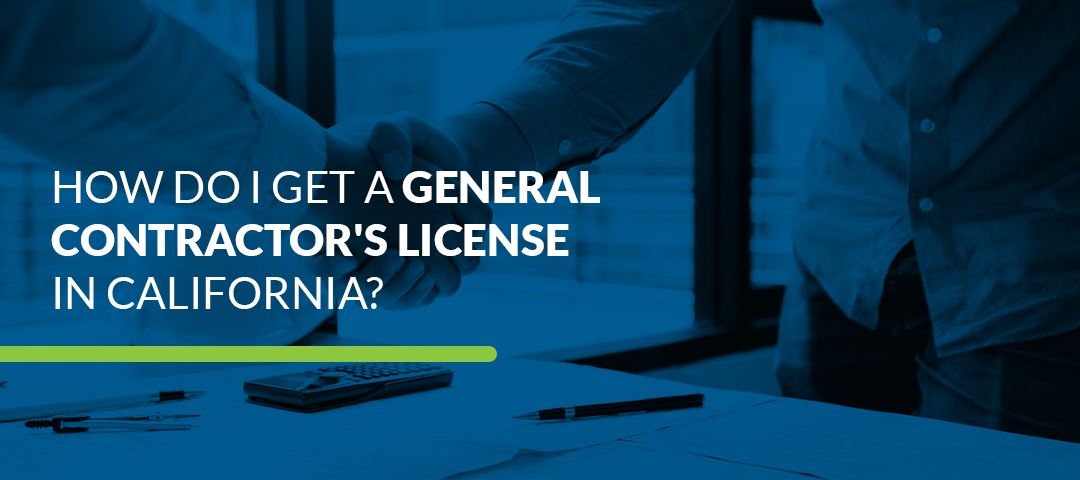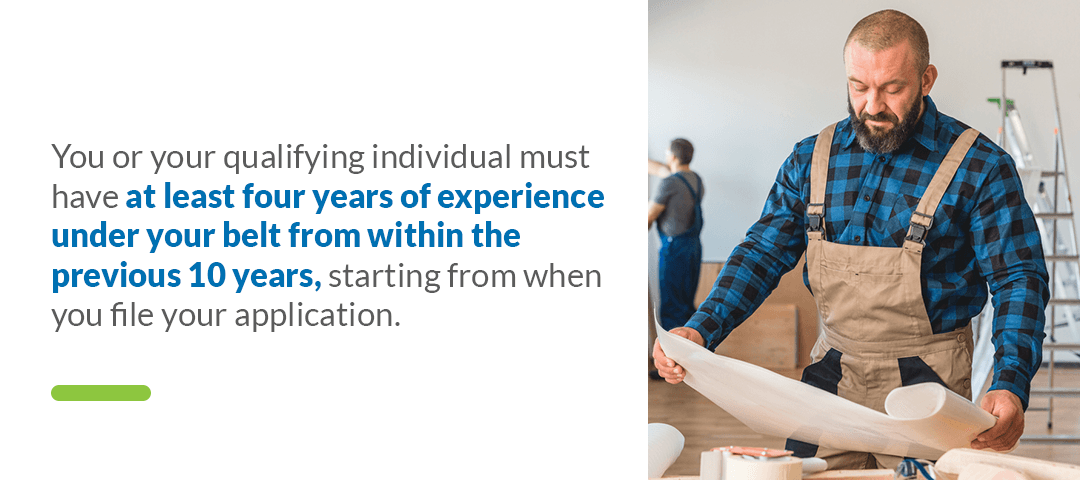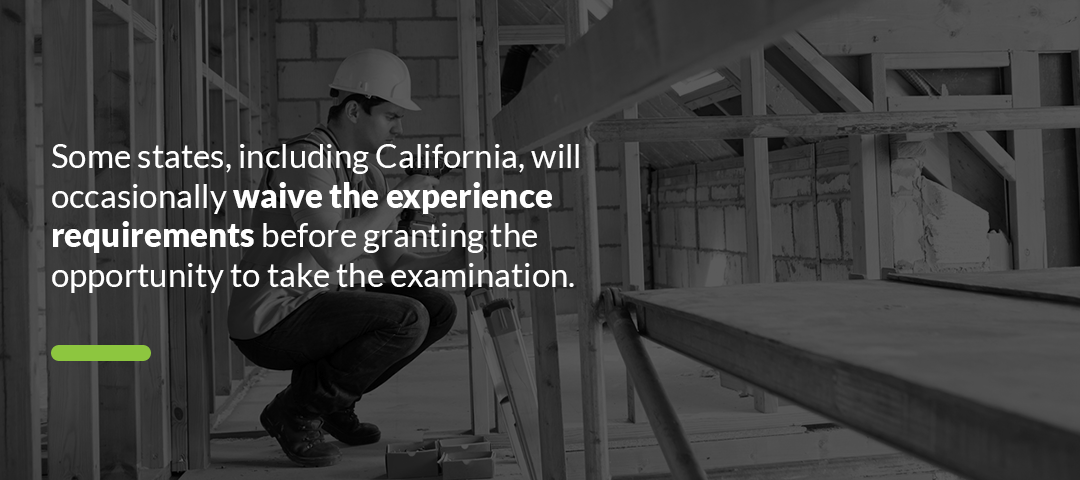
How Do I Get a General Contractor's License in California?
After spending years as an apprentice and moving through the ranks in the contracting industry, it's time to become your own boss. You've honed your skills for years, and you finally know enough to set up shop. The only thing standing in your way is an official certification to prove you're trustworthy and will stay compliant with local guidelines. You may be left wondering how to become a licensed contractor. In the state of California, the Contractors State License Board (CSLB) issues contractor's licenses.
It's a complicated process to apply and prove you have the right stuff, and that's a good thing. Construction and engineering is serious business. With a thorough application and testing process, our state can stop scammers and unqualified people from working in the industry. Then, hardworking builders like you can improve your reputation and grow your business.
Getting your license requires diligent work, and passing your exam is a badge of honor. Our guide for how to become a contractor is here to help you get started.
Do I Need a General Contractor's License in California?
If you're looking to start a business as a general contractor, you're almost sure to need a contractor's license before managing a project. California requires a company or individual to possess a contractor's license when constructing or altering any building, road, highway, railroad, parking facility, excavation or other structure within the state.
You qualify for an exemption if the project's combined value for labor and materials or any other costs is less than $500. However, you cannot break a larger project into smaller amounts to meet the rule. You might also meet the requirements for an exception if you are:
- A wage-paid employee who does not usually work in an independently established business and has no direction or authority over the work or finished results.
- Public personnel working on public projects.
- Someone working under specified conditions as part of public utilities.
- An owner or lessee performing oil and gas operations.
- An owner-builder improving existing structures on your property by yourself or with your own employees paid in wages.
- Someone selling or installing products that do not become a permanent part of the structure.
- An installed carpets seller in possession of a retail furniture dealer's license that contracts for installation using a licensed carpet installer.
- A security alarm company operator who sells, installs, maintains, services, alters or monitors any alarm systems except fire alarms.
- A person registered with the Bureau of Electronic and Appliance Repair whose activities consist only of installing satellite antenna systems on residential structures or properties.
You might qualify for a reciprocal license if you hold a contractor's license in Arizona, Nevada or Utah. You also have the right to work on your own home without a license, as long as the project doesn't affect structural integrity. Tasks such as painting, installing cabinets, patching walls or replacing carpet all count as repairs you can make to your own house without a license.
If you operate on projects without a license, you may owe some fees. By California law, you might spend up to six months in jail or pay a $500 fine plus an administrative fee ranging from $200 to $15,000. Besides this, customers aren't legally required to pay for projects valued at $500 or more if you are an unlicensed contractor. To avoid these penalties, study up on how to get a contractor's license in California.
What Are the Requirements for a General Contractor's License in CA?
There are several general qualifications and requirements for anyone seeking a contractor's license in California. As an individual, you need to be at least 18 years old and possess the trade expertise to handle the operations of a construction business, including the ability to supervise employees. You can also have representation by either an employee or business partner who has this experience, known as the "qualifying individual" (QI).

You or your qualifying individual must have at least four years of experience under your belt from within the previous 10 years, starting from when you file your application. For those four years, you or your qualifying individual must have served as a journeyman, supervisor, foreman or contractor in the same field for which the person is now applying. You should be able to back up and verify the accuracy of the experience claims made by the applicant.
You may still apply if you are out of state, and you may find it easier to get a license if your region has a reciprocity agreement with California.
If you meet the general requirements, you may begin compiling your application to receive your license. The license requirements include:
- A correctly filled-out application, including a fee of $330.
- Passing score on the California Law and Business Examination.
- Passing score on the open-book asbestos examination.
- Passing score on the trade-specific exam.
- Business license issued by the state of California plus your Tax ID, if applicable.
- Live Fingerprinting Scan.
- $200 original licensing fee.
- Limited Liability Corporation (LLC) Employee/Worker Bond if applying as an LLC, plus corresponding liability insurance.
- A $15,000 surety bond for yourself or your business and a $12,500 surety bond for your qualifying individual, if applicable.
- Certificate of Workers' Compensation Insurance or Self-Insurance of Workers' Compensation.
How to Get a General Contractor's License in California
First, fill out your application and mail in your $330 to CSLB. You'll include details on your business, personnel, qualifying applicant and certify the four years of experience gained. You'll also have to answer various questions on prior felony convictions, past licenses and military veteran status.
Do not submit your bonds or initial license fee with your application. You will send these after passing your exam. Once your exam application is accepted, you'll receive a packet for your Fingerprinting Live Scan and a notice to appear for your examination at least three weeks before the exam date.
When you submit your application, you'll need to prepare documentation such as:
1. Business Information
To register an LLC, corporation or partnership as a licensed contracting company, you need to supply information on the business itself. The details should include:
-
Full business name.
-
Business address.
-
Classification requested, either "A," "B," "C" or "D."
-
Category of business entity — either partnership, sole ownership, California corporation or LLC.
-
Surety bonds, liability insurance and personnel of record, if applying as an LLC.
-
Information regarding personnel, including names, date of birth, titles and other information.
2. Qualifying Individual Information
Whether you're applying as yourself or listing a qualifying individual, the CSLB needs some personal information, such as:
-
Full name.
-
Date of birth.
-
Current or former license number, if applicable.
-
Street Address.
-
Driver's license number.
-
Social Security Number (SSN).
-
Contact information.
-
Job position or title.
-
Share of ownership by the QI.
-
Signature.
3. Certification of Work Experience
The QI must fill out this section before someone familiar with the work certifies it as accurate:
- QI's full legal name.
- Business name, address and license number where QI worked.
- Indication of whether the QI gained the experience while working as a builder-owner.
- Indication of journeyman-level or higher experience.
- List of duties related to the classification the QI performed or supervised.
- Certifier's relationship to the QI, plus their street address, contact information and signature.

Can I Get a Contractor's License in California With No Experience?
If you're looking to become an honest contractor and gain a positive reputation with customers, we recommend following the path from apprenticeship to journeyman and beyond. You'll gain valuable experience and earn a living working under a licensed contractor. When you have the expertise to back up your skills, you're less likely to have your application rejected and can operate on projects with full compliance every time. Also, remember that consumers can look into your experience through organizations like the Business Consumer Alliance (BCA).
While California requires four years of qualifying experience, there are a few ways to become licensed without previous experience.
Using a Responsible Managing Officer (RMO) or Responsible Managing Employee (RME)
The most common way to get a contractor's license with no experience in California is by working with an RMO or RME. California law allows you to access the license of another contractor to maintain compliance on a larger job. You might do this when your business usually handles projects of $500 or less and wants to bid on a larger project. To borrow a contractor's license using this method, you would hire a licensed RMO as a project manager or employ an RME.
Receiving a Waiver From CSLB
Some states, including California, will occasionally waive the experience requirements before granting the opportunity to take the examination. If you are looking to go this route, you'll probably need exceptional circumstances and at least some experience to convince the board. The CSLB has no official guidelines on this process, and an exemption would only be possible on a rare case-by-case basis.

While still unlikely, you're more likely to receive a waiver for the examination by proving you have the necessary experience and meeting other qualifications. There's no guarantee they'll waive your exam, and they don't do so often. You can play the odds and apply for a test waiver if you meet one of these criteria:
- You are a qualifying individual on an active license within the license class you are applying for, and your license is in good standing.
- You have been a qualifying individual for a license in good standing within the license class you are applying for in the last five years.
- You have passed both the trade exam in the class of license you are applying for and the Law and Business Examination within the previous five years.
- You are an immediate family member of the holder of an active individual license in good standing, who held the license for five of the last seven years.
- You were actively engaged in the license holder's company for five of the last seven years, and the license is necessary to continue operations of a family-owned company in the case of death or absence of the license holder.
How Long Does It Take to Get a General Contractor's License?
How long it takes to get a general contractor's license in California depends on where you are in the process. It takes at least four years of experience at the journeyman level or higher to become a licensed contractor. A journeyman has usually spent time as an apprentice, which adds even more to your time.
The time it takes will depend on many factors once you meet the qualifications for a contracting license. Here's a look at the process:
- Application: Applying requires a lot of information and documentation. It can take you some time to get everything in order and answer all the questions. It can also take some time to get in touch with previous bosses or others familiar with your work to certify your experience.
- Application review: The California CSLB does not guarantee how quickly you'll get an answer after applying. Once you submit, you can use the Application Status Check tool to find out what date the board is working on for your certification type. The board updates this information weekly. The process usually takes longer for out-of-state applicants.
- Examination: If your application is accepted, you'll receive a notice to appear for the test. This letter will reveal your test date and should come three or more weeks in advance. Taking a class geared toward the exam can be beneficial. While various schools will structure their courses differently, a prep course can run for several weeks. If you pass your exams, you'll receive a notice at the testing site listing the required fees and documentation to get your license.
- Renewal: Once you earn your contractor's license, it's valid for two years from the last day of the month your license was issued. When you renew it, it will be active for another two years. You'll receive a renewal application from CSLB about 60 days before your expiration date. If it's 45 days out and your mailbox is still empty, you can request a renewal application online. Once you submit, your application will need processing, and the timeline can vary — so send it as soon as possible.
How Much Does It Cost to Get a Contractor's License in California?
How much is a contractor's license? The answer depends. The CSLB has several fees associated with licensing. Under the current rates, those fees include:
- $330 examination application fee.
- $200 initial license fee.
- $49 Live Scan Operator fingerprint processing fee.
- $60 re-examination fee, if needed.
- Rolling fee paid to Live Scan site of choice — costs vary, so find a location near you from the Department of Justice website.
- $450 timely renewal for an active license.
The total cost, not including the rolling Live Scan fee or the re-examination fee, comes to $579. The CSLB also has additional charges for many potential situations, such as replacing the qualifier, adding new personnel or partnerships and getting other certifications. You can find the full list of initial and renewal fees from the CSLB.
Besides the licensing fees, you'll need a surety bond for your business and your qualifying individual. The surety bond is a $15,000 payment to a surety company licensed through the California Department of Insurance. It exists to protect your future customers if something goes wrong during a project. If you have an RME or RMO as your qualifying individual, you'll likely need an additional surety bond of $12,500 unless the RMO owns at least 10 of the corporation's voting stock.
Contact Business Consumer Alliance for More Information Today
If you're looking to get your contractor's license in California, or are unsure if you need a license for a particular job, it helps to have some expert legal advice on your side. Between proving your experience, forming a business entity and getting the correct insurance, the legal snags involved in getting a license are enough to confuse anyone. You know what you're doing when it comes to building and remodeling, and you shouldn't need a law degree to prove that.
When you join the Business Consumer Alliance, you can access our attorney for free and receive a host of other benefits. Reach out to us today to get a free legal consultation and get ready to grow your business with your new license and the BCA in your corner. We can provide vital resources and help you learn exactly how to become a contractor in California, without the stress or hassle.
